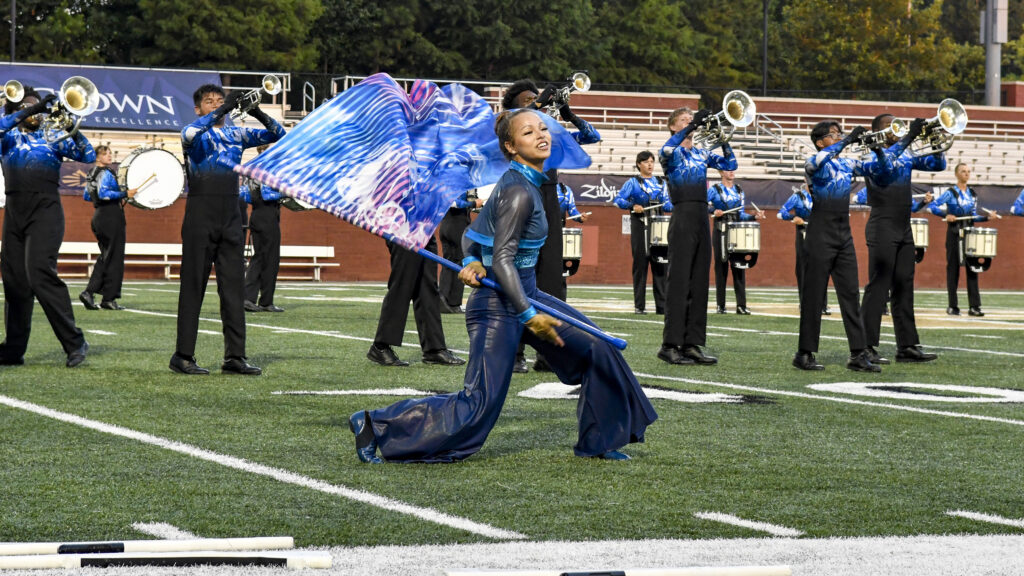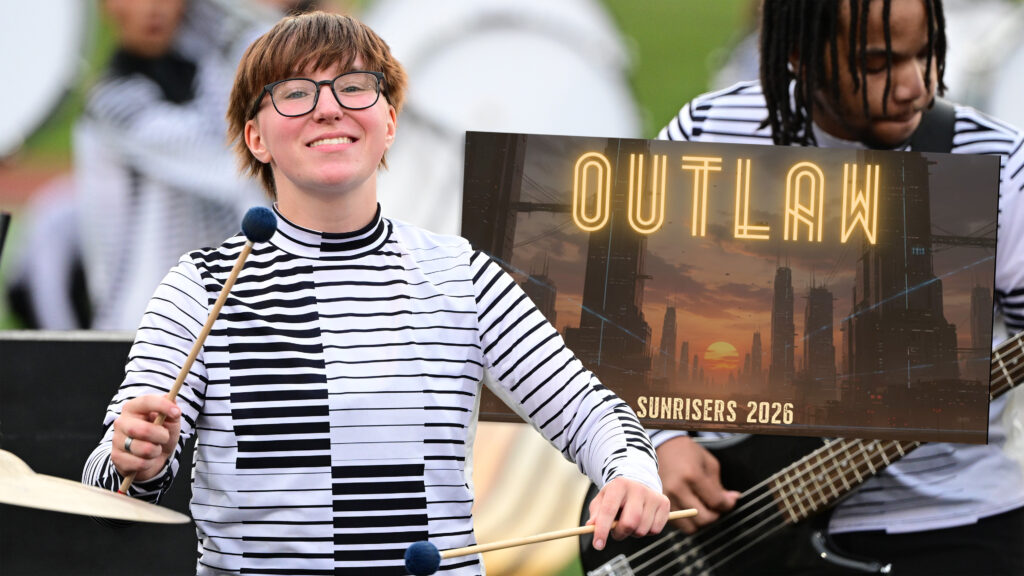We heard from David Pressley last week, when he wrote about experiencing D?©jà Vu as a bus driver for Southwind, in a gymnasium that awoke memories from 20 years prior. Today, David talks about another activity dear to his heart, the community brass band movement. For nearly 25 years, community brass bands have been sprouting up across the United States. These bands are generally made up of about 30 musicians and perform a remarkable variety of musical styles ranging from marches, orchestral transcriptions, Broadway tunes, big band, patriotic, and sacred works, to original compositions written specifically for this unique instrumentation. Typical instrumentation for a competitive brass band includes an E-flat cornet, eight to ten B-flat cornets, a flugelhorn, three or four tenor horns (resembles a miniature baritone but serves as the French horn or mellophone voice in the ensemble), two baritones, two euphoniums, three or four trombones, two E-flat tubas, two double B-flat tubas, and three or four percussion. These bands originated in Great Britain during the late 1800s. Coal mines and textile mills corporately sponsored the earliest brass bands as a diversion for their employees who, after a day of hard physical labor, had little interest in athletic pursuits. Soon, human nature being what it is, friendly rivalries began to develop between various bands in nearby communities. Competitions were soon established and, in time, many bands evolved to a semiprofessional status with firms seeking new employees who ‘just happened’ to be a pretty good euphonium (or cornet, or tuba, etc.) player. Today’s National Brass Band Championships in London’s Royal Albert Hall annually draw thousands of spectators, many equipped with personal copies of scores to the competition pieces so that they can follow along, to hear bands which have advanced through a series of regional championships. British-style brass bands first appeared in North America as elements of the Salvation Army, committed to the higher mission of that organization. (Phil Smith, principal trumpet player of the New York Philharmonic, is a Salvationist who began his playing career in a Salvation Army Band.) The secular United States brass band movement can trace its roots to the 1970s when Perry Watson, director of bands at North Carolina State University in Raleigh, founded a brass band to provide an additional elective for his students. By the early 1980s Watson was — with support from the Yamaha Corporation — hosting workshops promoting adult community brass bands. Within a few years such bands were operating in North Carolina, Florida, Maryland, Ohio, Indiana, Kentucky, Illinois, Iowa, New York, Colorado, California and Wisconsin to name just a few. Further, the North American Brass Band Association had been founded and was hosting an annual competition (first won by North Carolina’s Smoky Mountain Brass Band in 1983) based on the British model. Members of these brass bands are generally looking for something ‘more’ than the average community band experience. Many are school band directors or college music professors. Not surprisingly, a fair number of drum corps veterans are beginning to turn up in brass bands as well. The previously mentioned Smoky Mountain Brass Band of Asheville, N.C., currently rosters alumni of the Blue Knights, Florida Wave, Memphis Blues, Spirit of Atlanta and Suncoast Sound. Add one of the bands’ former directors and this list will grow to include the Santa Clara Vanguard. Additionally, former members of Avant Garde, the Cavaliers, and Crossmen have been short-term members before moving out of the area. In other examples, drum corps legend Ken Norman formed a brass band in Racine, Wis., just so “some of the old guys could get together and play a few more notes.” Ken himself has ‘played a few more notes’ as a member of the Illinois Brass Band during that groups’ NABBA Championship run and in performances at the Great American Brass Band Festival in Danville, Ky. Randy Guptill, director of the Duke University Wind Symphony, plays euphonium in both the Carolina Gold All-Age Drum and Bugle Corps and Triangle Brass Band of Raleigh, N.C. Previous Triangle Brass Band members include alumni of the Florida Wave, Colts, and Cadets of Greece. Surely there have been others. Generally speaking, these brass bands provide an instrumentalist the opportunity to continue playing at a reasonably high level. The possibility of perhaps competing at NABBA creates in these bands an atmosphere of striving for excellence, which drum corps veterans desire and are accustomed to. Given that so many drum corps alumni lead busy professional lives, the time demands from even a sometimes-nearby senior corps are often so great that not everyone has a realistic opportunity to fully participate. For those drum corps veterans who are fortunate to find themselves in a community with an adult brass band, the sound is ideal. David Pressley is a high school guidance counselor in Western North Carolina and marched in the Memphis Blues Brass Band Drum and Bugle Corps before ageing out of the Blue Knights in 1984. He has served as a bus driver for Florida Wave, Colts, Madison Scouts, and most recently Southwind.
NOTE: Following up on the column above, I’m adding below a reprint of a Web site review I wrote on the first brass band festival I’ve ever witnessed. The 2004 U.S. Open Brass Band Championships will be held on November 6 at St. Viator High School in Arlington Heights, Ill., so there’s plenty of time to make arrangements to attend this year’s event. Further information will be available on the host band’s web site. U.S. Open Brass Band Championships
By Michael Boo November 8, 2003
John Hersey High School Auditorium
Arlington Heights, Ill., USA Having never been to a brass band championship, being unfamiliar with the execution of the British brass band concept, and wondering what I got myself into by agreeing to review the inaugural event for a new annual championship, it’s perhaps easy to comprehend my anticipation at hearing the first notes of the Prairie Brass Band as the ensemble opened up the festival. E-flat Tenor Horns and E-Flat Basses … this is certainly not an American concert band brass ensemble. And what is this thing named “Repiano?” We don’t have anything like that in the drum and bugle corps world that I spend so much time covering. Frank Renton hosted the entire day. The host of BBC Radio 2’s weekly “Listen to the Band” program and an esteemed conductor, he kept things light and airy, while still managing to enlighten. The event was judged by DCI judge administrator John Phillips from Canada and Alan Morrison from Great Britain. Judging was based on a method of evaluation that focused on the positive qualities of the performance as opposed to simply recording technical errors, considering what was presented and how well it was performed. The event was organized by members of the Prairie Brass Band, headed up band president Clark Niermeyer, son of Prairie Brass Band director Dallas Niermeyer (a DCI judge). Dallas and Clark conceived the event over a period of years. Band members Lorian Hamilton and Linda Eckles were also deeply in the planning and execution of the event. Prairie Brass Band, under the direction of Dallas Niermeyer, opened the festivities with Stan Kenton’s 1941 classic, “Artistry in Rhythm,” arranged by Dallas Niermeyer. From the opening brash chords, it was apparent this idiom was far beyond anything conceived for a pep band. The sound of a brass band in a piece like this balances between being searing and boisterous. But in Adrian Drover’s “Mr. Nice Guy,” a smooth ballad featuring trombonist Linda Yeo, the urgency of the opening selection succumbed to the lush chordal accompaniment that comforted the soul. Michael Bull’s “An English Suite” is a contemporary take on English musical sensibilities. Jubilant and then heart-wrenching, the work closed with the forward propulsion of a march-like finale that got the blood to boiling again. Every session needs something on the lighter side, and Goff Richards’ “Breezin’ Down Broadway” brought together a number of classic Broadway hits with a large degree of “oomph.” The Caribbean-styled “St. Thomas,” arranged by Sonny Rollins, allowed the band to “cook” a little, letting the percussion groove sound like triple the number of players. The host band’s portion of the festival ended with William Rimmer’s classic march, “Slaidburn.” The chorus by the low brass rocked this writer’s laptop computer. Founded only six years ago, this up and coming brass band offered volumes of hope for the growth of the activity in the Midwest portion of this country. The Milwaukee Festival Brass, under the direction of Wales native Trefor Williams (wearing a kilt for this occasion), kicked off its power-packed collection of selections with Russell Alexander’s “Bedford’s Carnival March,” a hyperactive work liberally utilizing oodles of brass runs and articulate stabs of musical frosting. The lusciousness of Nicholas Brodosky’s “I’ll Walk With God,” (from “The Student Prince”), arranged by Goff Richards, allowed the band members to meld together into one solid sonority a sound more closely resembling something one might hear come out of pipe organ. This was the type of gut-wrenching chorale that can rip out one’s heartstrings. The audience was visibly moved by the richness of the performance. “Love Changes Everything” (from “Sunset Strip”), by Andrew Lloyd Webber and arranged by Stephen Bulla, unveiled the pop face of the ensemble. With percussion supplying a groove that never got in the way of the brass, the melody climaxed into a shimmering hit that would lead the audience to expect spotlights to shine from the sides of the stage. Goff Richards’ “Disney Fantasy” closed the band’s contribution with a tribute to some of the film studio’s best known and loved melodies. Recreating the tight resonance of a studio orchestra, this travelogue through the file cabinets of Disney hits offered a number of shimmering effects that required this writer to look up from the laptop more than once in order to figure out how the effect was being accomplished. Not just a collection of Disney tunes, this piece oozed a personal charisma that was matched by the band’s fastidious attention to detail. What followed next taught a new word to most of the Americans in the audience, “Buskers.” According to the program book, the term means “to play music or perform entertainment in a public place, usually while soliciting money.” Only traditional brass band instrumentation, plus percussion — with or without piano accompaniment — is allowed. Five members of the Foden’s Richardson Band from northwest England played the spiritual, “Just a Closer Walk With Thee.” The four-person tuba section from the Prairie Brass Band then played Van Morrison’s “Moondance.” Founded just three years ago, the Brass Band of Central Florida, under the direction of Michael J. Garasi, impressed the audience with its innovation staging and artistic flash. “Ardoss Castle” from “Hymn of the Highlands” by Philip Sparke opened with only four percussionists on stage. Lone brass voices off-stage accompanied the walking on to the stage by the small ensemble of brass that were soon to play. As the early sections took to the stage, sans conductor, one could swear the ensemble had snuck in a set of bagpipes. As crisp as a newly pressed pair of trousers, the articulation and blend of ensemble during the myriad style changes was nothing short of scary. Clive Barraclough’s “Simoraine” had sort of a circus march quality to it, with blazing trombones and clarion trumpet runs. Band member Chris Sharp’s arrangement of Ernesto Lecuona’s “Malaguena,” based on the famed arrangement of Johnny Richards for the Kenton Band, woke up every fiber of muscles among the audience members. One could be forgiven for expecting molten lava to come pouring out of the bells of the trumpets that took to the front of the stage. The solo melody to “Over the Rainbow,” arranged by Goff Richards, was lovingly delivered by an E-flat Horn player dressed in drag as the Judy Garland character from the movie, “The Wizard of Oz.” Long a standard of the American wind band, Sharp’s arrangement of Ron Nelson’s “Rocky Point Holiday” invigorated the tiles in the ceiling of the auditorium with its should-be-impossible-to-play runs and written-for-woodwind figures that left the audience somewhere between stunned and too impressed to think. A whirlwind of velocity akin to a tornado, the piece pushed further and further towards the edge technically possibility, risking sweeping itself right off the stage. Foden’s Richardson Band contributed a seven-piece Buskers group (Foden’s number 2) that got down and funky, with lots of disco-like choreography during its hard-driving rock groove that left the audience screaming in appreciation. After the lunch break, East Iowa Brass Band, directed by Earle W. Dickinson, took to the stage section-by-section like an old-fashioned American country scene of townspeople showing up for a picnic. Attired in “Music Man”-era garb, the members were out to have a grand old time, starting with “Lickety Split,” commissioned by the band and arranged by Steve Shanley. This piece was superimposed over a repetitive bass figure that got the feet of the audience to shuffling. The lovely chorales of “Scottish Hymns” by Charles Hutcheson, arranged by John Blanken, gradually increased in intensity, until a euphoric culmination of emotion swept the piece away under a wave of bliss. Jeffrey Argrell is known as a jazz composer. His “Oh No!,” built upon a casual walking bass figure, provided a swinging contrast. Russel Alexander’s “Belford’s Carnival March” was delivered in a calliope-like fashion, becoming ever faster before to its close. “Hymn of the Highlands, Mvts. I & III” of Philip Sparke started with an elegiac chorale, followed by a vigorous rouse of Highland glee. “Mvt. III,” sprinkled over a bed of vigorous drumbeats, heralded the numerous brass proclamations that were to follow, some rather violent in temperament, ultimately being overtaken by a sense of victorious acclamation. The next Buskers on the docket was “Jazz on the Prairie,” a Blues Brothers-inspired presentation by members of the host band. Foden’s Richardson Band has been around since 1900, with a quite distinguished past as one of the top groups in England for several decades. Under the direction of Thomas Wyss, the ensemble has maintained its place among the pantheon of brass bands in the world. The fanfare proclamation of “Festmusick der Stadt Wien” by Richard Strauss, arranged by Eric Banks, showed just how rich and full such a band can be. The opening sound caused people to flinch in amazement, as it sounded as if a couple hundred players were on the stage. Kenneth J. Alford’s march, “Army of the Nile,” put the “brass” in “brassy.” Egad, this interpretation could cause eyeglasses to shatter. Thunderous one moment and tender the next, the band clearly demonstrated its ability to unleash power when needed and constrain the power for dynamic contrast. “It’s a Lovely Day Tomorrow” by Irving Berlin, arranged by Howard Snell, allowed all to swim in the band’s gorgeous ensemble vibrato. Based on “Rule Britannia,” “Air varie,” arranged by Alan Fernie, showed off the awesome technique of one of the band’s most versatile members, Glyn Williams, playing a solo on euphonium, cornet, trombone, flugelhorn, E-flat horn, piccolo trumpet and a finishing flourish on xylophone. This production was truly remarkable beyond words. The comical “Hornpipe Humoresque” by Noel Rawstorne, arranged by Andrew Duncan, feat…
- Marching Music's Major LeagueTM





